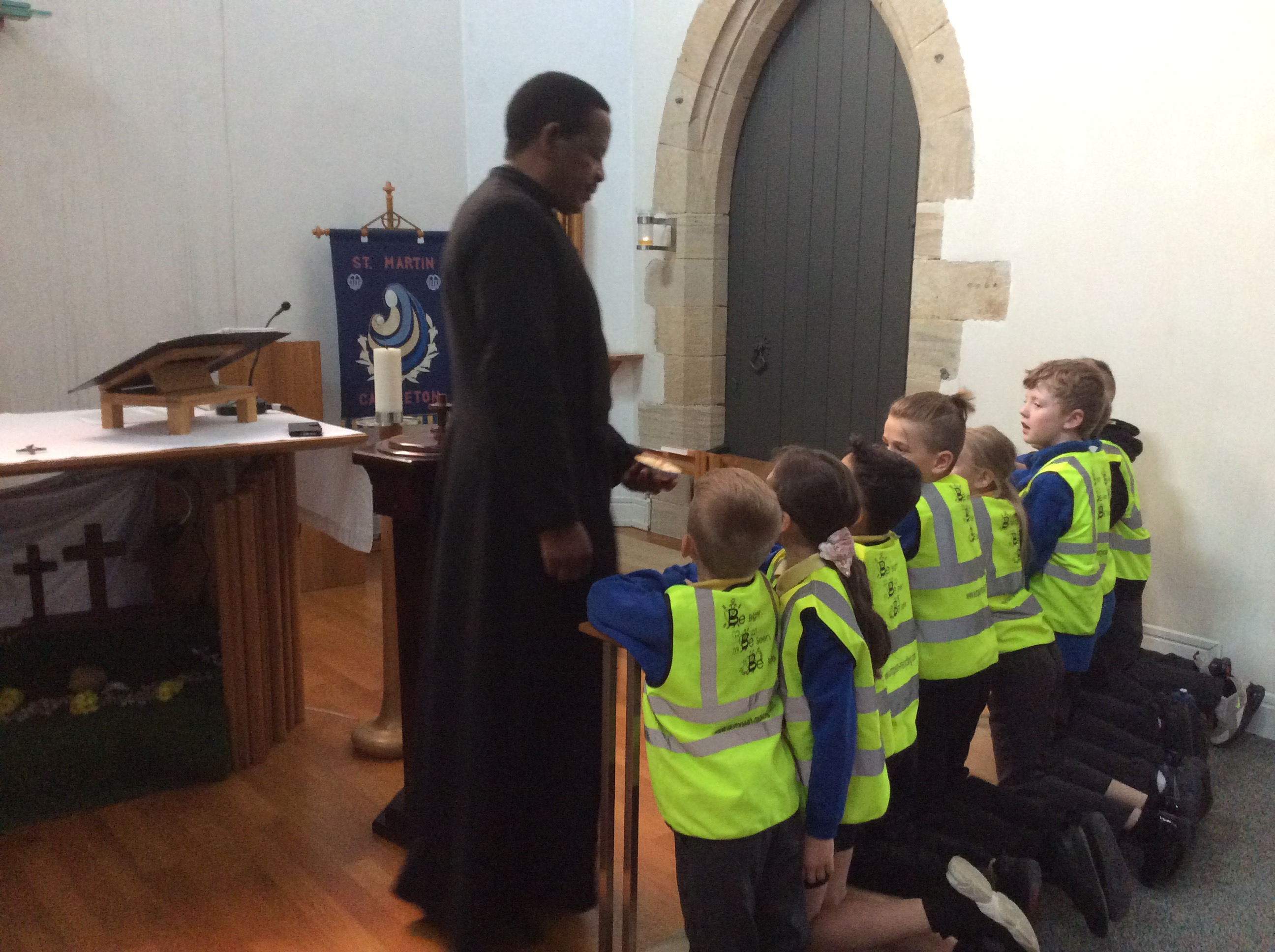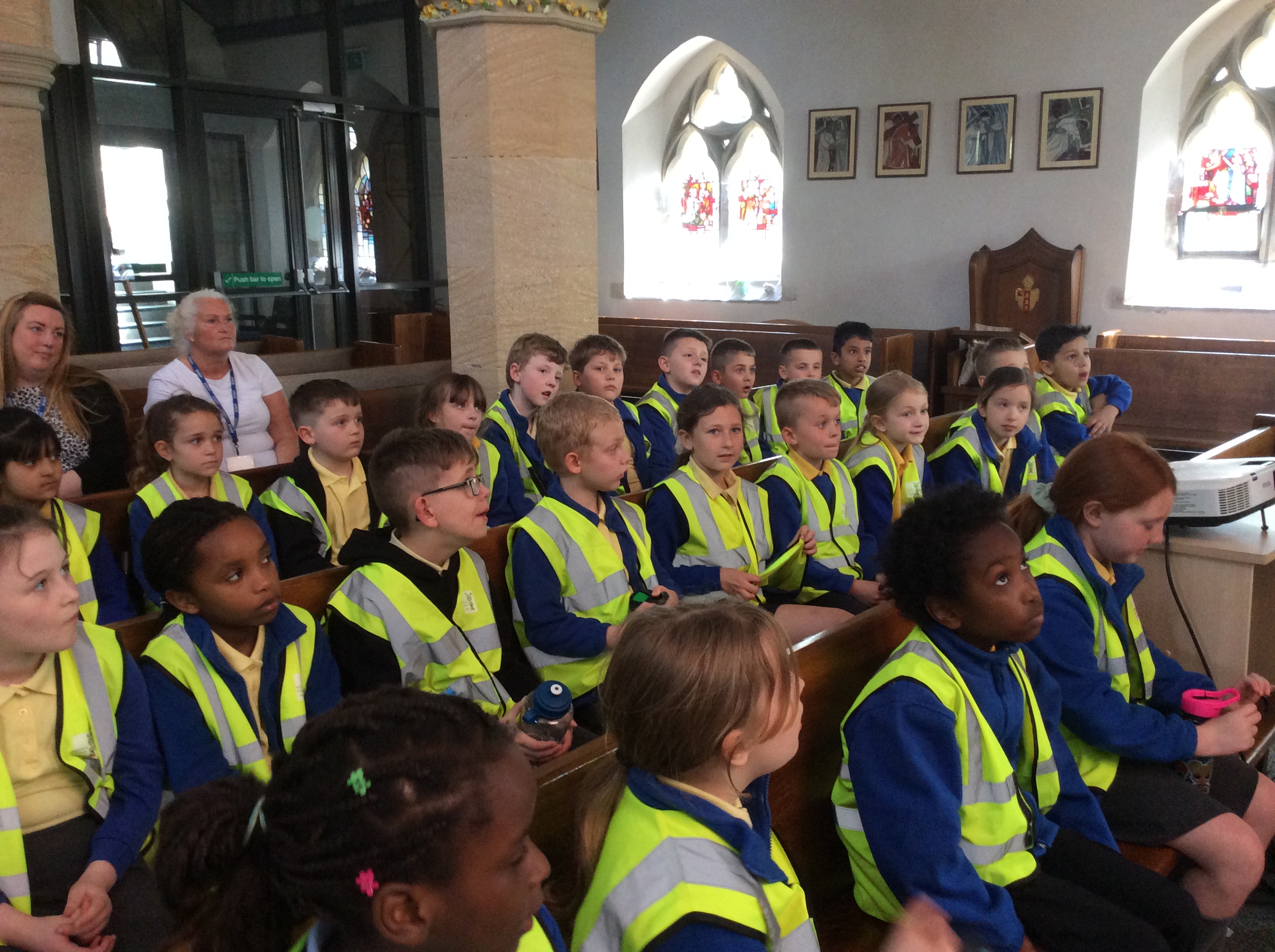RE
St Edward's - A caring Christian Community where children achieve their potential, are confident in themselves and their abilities and are set on a positive path for life.
Through the teaching of RE, as part of our wider school curriculum and extra-curricular activities it is hoped that our children will develop the knowledge, attitude and skills required to reflect the aims of our mission statements. These aims are –
Be kindhearted, be thankful, work hard, never give up, always be honest, forgive and forget, keep your promises but most important, love one another.
The teaching of RE will give our children the opportunity to look at the big questions of life. It will give a safe and structured environment where these can be explored at each child’s individual level. It will lead to a respectful understanding of a variety of outlooks on life and will give our children a framework from which they can begin to explore, develop and articulate their own thoughtful world view as well as understanding, appreciating and learning from the views of others.
At St. Edward’s Church of England Primary School, the aim of Religious Education is to help children acquire and develop knowledge and understanding of Christianity and other principal religions and world views, focusing particularly on Christianity and those reflected in our local area.
Children will gain the ability to express and communicate ideas related to these religions and world views and will develop the skills to ask questions and reflect on their own feelings and experiences, as well as those of others. They will gain an understanding of how religious beliefs shape the lives of individuals, families and communities. Religious Education is taught throughout the school in such a way as to reflect the overall vision and values of the school. It also contributes to the wider teaching of British Values, and the promotion of the spiritual, moral, social, and cultural development of our children.
The teaching of RE at St Edward’s is based on the Rochdale Agreed Syllabus for Religious Education 2019-2024. This syllabus is based on question led units ensuring that pupils gain relevant knowledge whilst also encouraging investigation, independent thought and personal reflection.
In the Foundation stage children will encounter different religions and world views through exploring their own experiences and those of others around them. This will happen naturally during daily activities, but will also come through more focused discrete lessons. They will encounter special people, books, times, places and objects. They will listen to and talk about stories and experiences. They will ask questions and reflect on their own feelings and experiences.
In KS1 children will start a more formal approach to building up their knowledge and understanding of religious and world views, focusing mainly on Christianity and Islam, as is reflected in our school. They will develop their use of the correct vocabulary and terminology. They will continue to ask questions and express their own views. They will start to recognise what communities and individuals do and the reasons that underpin these. They will begin to recognise and respond to emerging themes such as special times and places.
In KS2 children will extend their knowledge of religions and world views and start to recognise their importance and significance on a local, national and global scale. They will continue to explore ideas, themes and beliefs in Christianity and Islam, whilst extending this to include Judaism in Year 3 and 4, and Hinduism and Humanism in Years 5 and 6. They will be encouraged to ask their own challenging questions about human life and be able to explore a range of responses. They will begin to form their own ideas and be able to give reasons explaining their ideas and views as well as being able to identify, understand and explain the views held by others.
RE as a subject is open, broad and explores a range of religious and non-religious world views. In the UK, parents have the right to withdraw their children from RE on the grounds that they wish to provide their own RE. This provision will be the parents’ responsibility. If this is the case, you will need to arrange a meeting to discuss this with the headteacher.
A Curriculum for Our Children
We have identified some core barriers that the children of our school face when they are accessing the curriculum, and we intend to deliver the RE curriculum with an approach that addresses these:
- Vocabulary – Children are provided with clear definitions for new vocabulary. Relevant vocabulary is displayed and referred to throughout a unit of work. Teachers model the use of this vocabulary accurately, and allow children opportunities to experiment with it.
- Communication and teamwork skills – our RE curriculum is shaped around questions which allows for plenty of discussion opportunities. Children are encouraged to develop their listening and response skills during RE lessons.
- Resilience – Some of the concepts covered in RE can be quite challenging. Teachers do not simply accept surface-level responses and probe so that children consider ideas on a deeper level. This develops children's resilience and willingness to keep working hard in order to improve.
- Differing and sometimes limited life experiences – We offer a curriculum of breadth and wider opportunity. We provide children with opportunities to expand their knowledge and experience of RE beyond the classroom through visits to places of interest; talks given by religious leaders; interactive activities.
A Curriculum for All Children
Ambition
Our ambition in RE for children with SEND is in line with the ambition we hold for all children.
It is important to us that children who have limitations in one area are not affected by this across the curriculum.
We aim for our children with SEND to develop the confidence to express and communicate ideas related to the religions and world views they learn about. We want them to be able to ask thoughtful questions and reflect on their own feelings and experiences, as well as those of others.
We know that some of our children who have SEND may struggle to think flexibly. We want to support all of our children so they can accept that others may hold different views and beliefs to their own, and to know that this is ok.
Access (how we support children with SEND to thrive in this subject)
-
Visual links to keywords / festivals / artefacts for help recalling key aspects of a religion or belief
-
Use of artefacts to help children to make links with the concepts / belief of a religion
-
Regular revision of prior knowledge to allow children to make links to previous religions that they have learnt about throughout their time at school.
-
Mixed attainment pairings may be used to encourage rich discussions
-
Revisiting the key facts / vocabulary at the start of each lesson.
-
Prompts for discussion lessons with visuals where appropriate
-
Additional adult support when necessary
RE in EYFS
In the Foundation Stage, children encounter different religions and world views through exploring their own experiences and those of others around them. This happens naturally during daily activities, but also comes through more focused discrete lessons.
Reception children encounter special people, books, times, places and objects. They listen to and talk about stories and experiences. They ask questions and reflect on their own feelings and experiences.
All of this lays strong foundations and prepares them appropriately for RE lessons in KS1.
Assessment in RE
Accordion content


